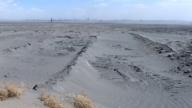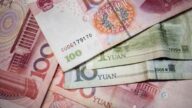【新唐人2014年09月15日訊】過去十年來,中共大量在全球範圍內收購原材料,投資礦業。然而很多大規模交易都在虧損。中信泰富耗資百億對澳大利亞「中澳鐵礦」的收購,就是一個明顯的例子。「中澳鐵礦」項目的成本超過預算三倍,並且在該項目投產的第一個年份:2014年,就可能損失數億美元。大陸學者指出,中共的海外投資已經成為貪官們「化公為私」,轉移資產的絕佳機會。
《華爾街日報》9月11日報導說,中信泰富有限公司收購澳大利亞的鐵礦項目「中澳鐵礦」,是中國過去十年來,收購原材料策略失敗的一個例子。這個項目總投資達100億美元,耗時已經超過八年。
《華爾街日報》說,中信泰富及其承包商們,在這個項目上犯了一系列的錯誤,從想當然地認為,可以用國內工資水平向澳大利亞輸出工人,到失敗的匯兌押注,最終不得不從母公司中信集團請求15億美元的救助。
過去十年來,中國迅速在全球範圍內收購大宗商品資產。去年,中國的境外資源投資飆升到533億美元,而在2005年只有82億美元。如此大量的採購,已經產生了無數的不良投資。很多大規模交易都在虧錢、承擔意料之外的成本、或是產出遠遠不及預期。
僅根據官方媒體報導,去年中國礦業協會的負責人估計,總體海外礦業交易有80%都失敗了。
《華爾街日報》分析說,中國投資虧本的原因是多方面的。在全球資源熱潮中,中國是一個後來者,而且經常為資產支付過高的價錢。摩根大通亞洲油氣研究部門的負責人達林說,一般而言,中國會為油氣資產支付比行業平均價格高20%的價款。
中國勞動關係學院教授王江松:「海外併購,中國人技術層面不夠。人家海外併購都做了上百年了。你中國剛開始。在和外國人打交道的時候,你對當地的政策法律經營管理,各方面的情況,社會環境,經濟環境,並不是很了解。貿然的進軍海外市場,收購其他的一些資源,可能在經濟上不一定算得過人家,在交易上可能會吃虧。」
中國勞動關係學院教授王江松指出,海外投資虧損的另外一個原因是,權貴利益集團通過海外併購這種方式,把國有資產私有化,導致國有資產大量流入私人腰包。
王江松:「它超過預算三倍,這怎麼回事?國有企業在海外的併購不受內部工人,也不受社會,也不受立法機構,也不受任何人的監控。那麼從道理上推測,這裡面可能有一些洗錢的,通過海外併購轉移資產的問題。4.09這是一個黑洞。這是毫無疑問的。因為沒有監管,沒有有效的監管。」
澳大利亞《悉尼時報》總經理、著名時事評論家楊恆均對《新唐人》表示,由於缺乏監管,中共海外投資基本上都是個人發財,國家虧損。
澳大利亞《悉尼時報》總經理楊恆均:「主要原因就是這個制度,貪官, 每個人,包括周永康在外面搞石油。周永康是政法委書記,海外石油很多都是他在壟斷。榮智健這些,很多在海外的投資,基本上他們只相信自己的人,海外投資沒有中國老百姓主導的。」
楊恆均表示,中共海外投資成為太子黨侵吞國有資產,和轉移國內資產的一個重要途徑。到了海外,山高皇帝遠,項目負責人貪不貪污?拿多少回扣?決策有沒有科學根據?都是一團亂帳。
9月11號,香港證監會起訴中信泰富原董事長榮智健等五名前董事,謊報公司財務狀況,造成股票投資者損失。證監會要求他們,向4500名總共斥資19億元的投資者賠償,並要求法庭制裁五人。而榮智健,是前國家副主席榮毅仁的兒子。
採訪編輯/秦雪 後制/肖顏
Failure—80% of China's Overseas Mining Deals Lose
Over the past decade, the Chinese Communist Party (CCP)
has invested heavily in raw materials overseas,
but the majority of its trading is losing money.
CITIC Pacific invested $10 billion on its Sino Iron project,
purchasing an Australian mine producing magnetite iron-ore.
Despite costing four-times its initial budget, it may lose
hundreds-of-millions of dollars in 2014—after only one year.
Experts say the CCP's overseas investments give corrupt
officials a perfect opportunity to 'privatize' national assets.
The Wall Street Journal (WSJ) says the $10-billion mine
that's taken over eight years to develop in Cape Preston
is evidence of just how much has gone wrong with China’s
decade-long push to buy up raw materials worldwide.
Citic Pacific and its contractors made a series of blunders,
from thinking they could import workers at Chinese pay levels
to a botched bet on currencies that forced the company
to seek a $1.5 billion bailout from its parent, reported WSJ.
WSJ added, China rushed to buy up global commodities as
its economy boomed—both to feed its factories and to ensure
it wasn’t reliant on Western powers for raw materials.
…Investments in resources soared to $53.3 billion last year,
from $8.2 billion in 2005, according to an investment
database compiled by the American Enterprise Institute
and the Heritage Foundation, continued WSJ.
The head of China’s mining association estimated in 2013
that out of all overseas mining deals, 80% had failed.
China came late to the global resources boom and often
overpaid for assets Western companies had passed over
or wanted to sell, says WSJ, adding; China typically paid
one-fifth more for oil-and-gas assets than industry average,
estimates Scott Darling, Asian regional head of
oil-and-gas research at J.P. Morgan Chase & Co.
Prof. Wang Jiangsong, China Institute of Industrial Relations:
“China lacks technique in overseas mergers and acquisitions."
"The West have been doing overseas mergers
for hundreds of years, but China has just started;
it lacks information on the local policy, laws, management
and in social and economic aspects."
"Rushing into foreign markets and into acquisitions
could turn into a financial disadvantage."
Prof. Wang says another reason for overseas investment loss
is the privatization of state-owned assets by the political elite.
Wang Jiangsong: “How did this budget that was
more than three-times the initial amount come to be?"
"The overseas acquisitions by state-owned enterprises
are not subject to any supervision, like by internal workers,
the society, or by legislative bodies."
"So theoretically, money laundering through overseas
acquisitions is possible; it's a black hole for sure,
as it lacks supervision or any effective regulations."
Commentator Yang Hengjun says the CCP's investment has,
due to lack of supervision, allowed individuals to gain wealth
at the cost of national assets.
Yang Hengjun, general manager, Sydney Times:
“The main reason is the system and the corrupt officials;
everyone, including Zhou Yongkang and his oil group,
monopolizes overseas oil investments."
"Larry Yung, the former chairman of CITIC Pacific,
was one of his allies; they trust only their own people."
"The numerous overseas investments
have never been led by the Chinese people."
Larry Yung is the son of China's
former Vice President, Rong Yiren.
The CCP's overseas investments are one primary way
for princelings to embezzle state assets, says Yang Hengjun.
The project leaders are all corrupt, and being overseas,
no one can control them; the accounting is just a mess.
Sept. 11—the Hong Kong Securities and Futures Commission
(SFC) filed a lawsuit against five former CITIC Pacific chiefs
—including Larry Yung—for lying about the company’s
financial state, which resulted in a loss by equity investors.
The Commission sought compensation for 4,500 victims
who had lost a combined total of $1.9 billion in investments.
Interview & Edit/QinXue Post-Production/XiaoYan






























